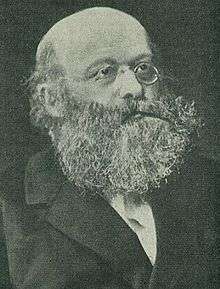Julius Jacobson (ophthalmologist)

Julius Jacobson (18 August 1828 in Königsberg – 14 September 1889 in Cranz) was a German ophthalmologist, known for his efforts in establishing ophthalmology as an independent subject in Prussia, separate from surgery.
He studied medicine at the University of Königsberg, receiving his doctorate in 1853. Following graduation, he furthered his education in ophthalmology at Prague under Carl Ferdinand von Arlt and at the University of Berlin as a pupil of Albrecht von Graefe. Afterwards, he returned to Königsberg, where in 1856–58 he worked as an assistant to Albert Seerig at the university surgical clinic. In 1859 he obtained his habilitation for ophthalmology, and two years later became an associate professor. In 1873 he was named a full professor of ophthalmology at the University of Königsberg, where he later became director of newly constructed eye clinic.[1][2]
His name is associated with "Jacobson's retinitis", a condition that is also referred to as syphilitic retinitis.[3]
Selected works
- Ein neues und gefahrloses Operations-Verfahren zur Heilung des grauen Staares, (1863) – A new and riskless operative method for healing opaque cataracts.
- Mittheilungen aus der Konigsberger Universitats-Augenklinik 1877-1879, (1880) – Communications from the University of Königsberg ophthalmology clinic in 1877–79.
- Albrecht von Graefe's Verdienste um die neuere Ophthalmologie, (1885) – Albrecht von Graefe's contribution to recent ophthalmology.
- Beiträge zur Pathologie des Auges, (1888) – Contribution to the pathology of the eye.[4]
References
- ↑ Hitz - Kozub; edited by Rudolf Vierhaus Deutsche Biographische Enzyklopaedie
- ↑ Jacobson, Julius In: Neue Deutsche Biographie (NDB). Band 10, Duncker & Humblot, Berlin 1974, ISBN 3-428-00191-5, S. 246 f.
- ↑ The American illustrated medical dictionary by William Alexander Newman Dorland
- ↑ Google Search published works